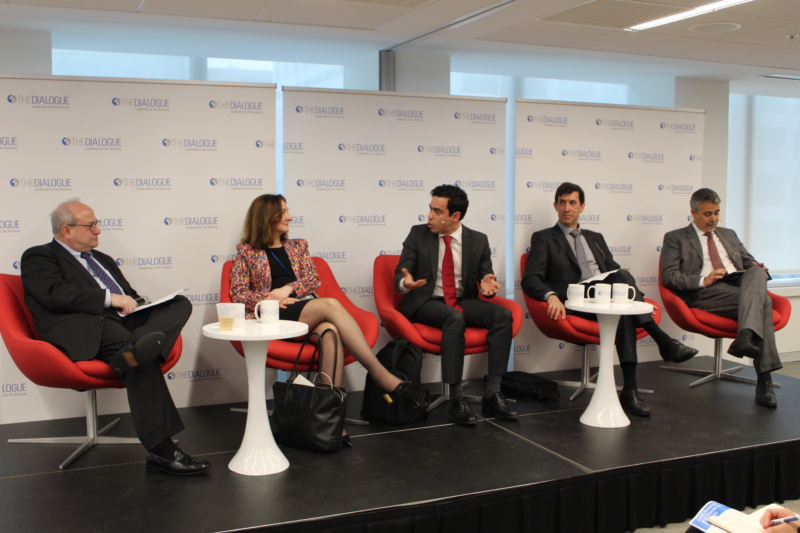Mexico: How Far Have its Institutions Really Come?
The question remains if Mexico has achieved a degree of institutional development consistent with its participation in those organizations.
On April 12, the Inter-American Dialogue hosted an event titled “Latin America’s Digital Economy and Trends in International Taxation.” The event was moderated by Michael Shifter, the president of the Inter-American Dialogue and featured panelists Karim Lesina, senior vice president of international and regulatory affairs at AT&T Services Inc., Grace Perez-Navarro, deputy director at the Center for Tax Policy and Administration at the OECD, Luis Alberto Rodriguez, the deputy minister of finance of Colombia, and Ubaldo Gonzalez, the senior sector specialist in tax and administration at the Inter-American Development Bank. The discussion took place in the context of a recent OECD report, that reported that a global consensus on how to tax businesses with a substantial digital footprint but no physical presence in a given country remains elusive.
Grace Perez-Navarro opened the discussion by providing background on past attempts to address an increasingly digitalized global economy. She explained how the OECD first discussed digitalization in 1998 to create the Ottowa Framework Conditions on Ecommerce. Although there was much debate about how to reform taxes to better address digital economies, participants concluded that the current rules could still address problems of taxation. In the past two decades following this initial meeting, there have been various attempts at coming to a global consensus; however, no concrete actions have resulted. In 2015, the BEPS report ( base erosion and profit shifting initiative of the OECD) was released, acknowledging that physical presence rules need to be rethought, however, no changes were agreed upon. Then in March 2018, the OECD released an interim report that still did not come to a consensus, rather it encouraged countries not to take unilateral actions before the OECD’s promised report in 2020. The 2020 report is expected reform taxation to address the mismatch between taxation and value creation for digital activities.
@the_IDB and @ATTpolicyintl highlight the potential (revenues, jobs) from broadening the tax base in a #digitalised Latin America: formalisation, anti piracy, data use. #LADigitalTaxation pic.twitter.com/2kMCy6C7Ci
— Angel Melguizo (@AngelMelguizo) April 12, 2019
The panelists discussed how there are various approaches on how to address tax reforms, which can be divided into three broad categories: waiting for guidance from the BEPS report in 2020, introducing targeted measures focused on user contributions, and approaching digital taxation more broadly addressing marketing intangibles. The panelists agreed that countries should follow the first approach rather than implement unilateral actions. Perez-Navaro expressed how the OECD does not condemn unilateral actions but has put parameters around unilateral measures to limit their influence. She explained how the dangers with implementing temporary unilateral measures to raise revenue from digital economies is that they often become permanent.
González also advised against unilateral measures to address digitalization. He pointed out that any measures taken now would only be short term because the 2020 report will change the framework of taxation. Therefore, countries should wait for the 2020 report and act in unison. Lesina echoed González and explained how unilateral actions create uncertainty which is bad for investment. Furthermore, it is unclear how tax laws will change with the 2020 report, so it doesn’t make sense to create new short term laws, especially since the effects of these unilateral measures are unknown. Lesina expressed the need to think long term, for the OECD to develop a common principle not just find solutions for specific sectors. He placed emphasis on the need for intervention to create fairness.
What is digital? Who is digital? We are all digital. It is changing consumption, but we are living with rules of yesterday in a digital today. - Karim Lesina of AT&T at The Dialogue today. @The_Dialogue #LAdigitaltaxation #digitaleconomy #innovation #latinamerica pic.twitter.com/PZ4afJXJBJ
— Rachel Y Carillo (@PT4Breakfast) April 12, 2019
Alberto Rodriguez also stressed cooperation, warning that even if a consensus is reached, there will be implementation challenges. Furthermore, he pointed to the critical need to increase the capability of tax agencies. Especially in emerging market, the delivery of this service is underdeveloped and underfunded.
González explained the role of multi-lateral institutions in the tax reform process. He highlighted how the Inter-American Development Bank’s role is to support countries in tax reform rather than take the lead. He pointed to two effects of digitalization that specifically affect developing economies. First, high levels of consumption taxes uniquely affect emerging markets, and second, the corporate income tax, which is at 25% in Colombia and 22% in Mexico is not being collecting from digital economies. In response, he proposed the implementation of digital services tax of 2-5%.
Very sharp points on the challenges to get taxes right in digitalised economies by VM Rodriguez from @MinHacienda: Generational (young users vs tax payers); Global coordination (e.g. OECD); Tax administration capabilities #LADigitalTaxation pic.twitter.com/MbDRGtFSSY
— Angel Melguizo (@AngelMelguizo) April 12, 2019
Lesina raised a separate issue of high levels of informality in Latin American economies. He argued that addressing the issue of lost tax revenue to the informal economy is equally as challenging as confronting the digitalizing economy. The long-term solution is reducing informality. Currently, about 25% of private services aren’t taxed, a huge loss in revenue for the government. This example put the question of digital taxation into perspective.
Overall, the panelists agreed that the digitalizing economy is creating a need to reform tax laws and that these reforms should be addressed on a global level to create certainty and ensure fairness. At the end of the discussion the audience had the opportunity to contribute to the debate. Many of the questions raised were concerned with countries acting unilaterally and passing short term laws because a global consensus has not been reached. One audience member expressed how countries are concerned with how much revenue they are losing to digitalization. Perez-Navarro responded that although countries are losing revenue to digitalization, the amounts have not been quantified. In fact, lost revenue is not just a problem created by digitalization. It is a larger problem of excluded goods like “fancy” foods, which are not adequately taxed, giving the rich an unfair advantage. One concrete action that developing countries can take to increase tax revenue is reforming the VAT. Perez-Navarro explained how the OECD has developed a toolkit to implement VAT taxes in order to raise revenue. She also gave the example of Australia, whose government removed the exemption for low value goods and recovered $81 million in the first quarter after the reform was passed. She estimated a loss of $5-7 billion a year from forgone taxation in Latin American countries. Therefore, there are many ways to increase government revenue, without tackling the increasingly digitalizing economy. That being said, the OECD report in 2020 is expected to tackle taxation reform and adequately address the new era of digital taxation.
The question remains if Mexico has achieved a degree of institutional development consistent with its participation in those organizations.
How much do the Western Hemisphere’s two largest economies, Brazil and the US, redistribute through social spending and taxes?
The key to resolving Costa Rica’s fiscal deficit lies in a major reform that would replace the country’s sales tax with a value-added tax.
 Sofia Lalinde / Inter-American Dialogue
Sofia Lalinde / Inter-American Dialogue

